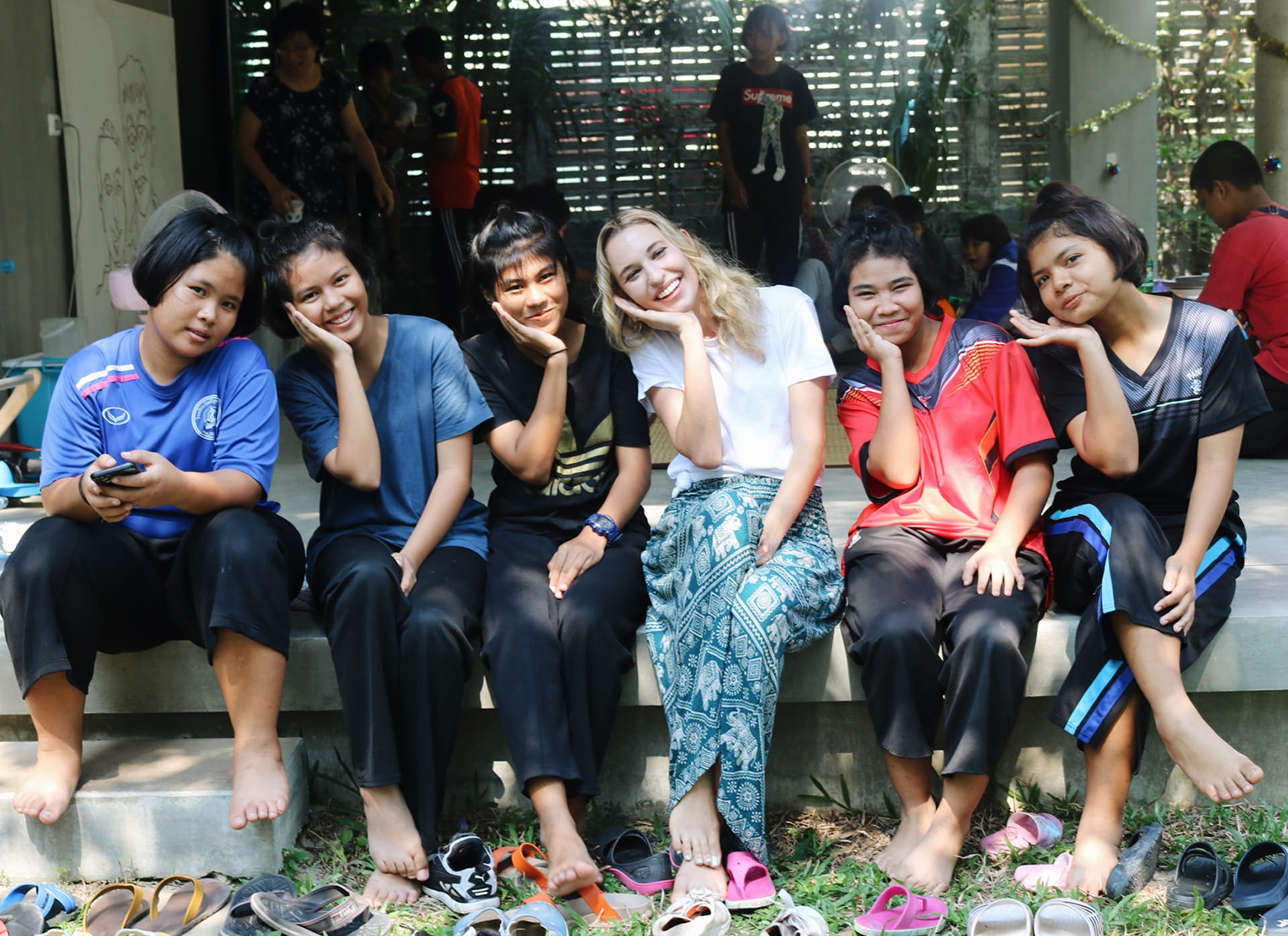By Ella Murdock Gardner ’22

Two Burmese girls smile out of a photograph. One wears thick winged eyeliner, dollops of glitter across her cheeks, and a set of dark painted eyebrows which arch high over her natural ones. The other girl’s face is also painted, but in a surprisingly different way—her eyebrows blend upward into clouds of neon green paint. A tiny pink heart adorns her nose. Vivid blue wings unfurl along either side of her mouth.
This photo was taken by Allison Joseph ’20 during the second day of the “Ideal Woman” workshop she created for Burmese girls and women in Myanmar last winter, a trip partially funded by a Laspa Center for Leadership service award. She had asked the girls to paint each other’s faces into the “Ideal Woman,” challenging them to reflect on their own conceptions of beauty and feminine identity. “I believe that art is a powerful vehicle for personal expression,” Joseph says.
Using activist theater, the “Ideal Woman” workshop explored women’s traditional and cultural roles in their communities. By the end of the workshop, armed with newfound confidence and creative props they’d made from nature, her students performed a five-act play which tackled issues they faced in their day-to-day lives, from navigating difficult relationships with their fathers to not being allowed to play sports with their male classmates. “It spurred dialogue within their schools and their community, and that’s all I could have asked for,” says Joseph.
Joseph’s path to Myanmar began when she transferred to Scripps after having spent a year at the University of California, Berkeley and a year and a half at the University of Oxford. She was attracted to Scripps by the strong cohort of female professors and students and the interdisciplinary curriculum, which would allow her to double major in psychology and environmental analysis. Arriving at the College in the fall of 2017, Joseph immersed herself in the community, joining the 5C Mental Health Alliance, volunteering at the Pomona Farm, and engaging with EnviroLab Asia, an initiative at The Claremont Colleges which supports interdisciplinary research into environmental issues in Asia.
In 2018, Joseph traveled to Thailand and Myanmar on a research trip organized and facilitated through EnviroLab Asia, which sparked her passion for women’s rights in the Southeast Asia. Back at Scripps, Joseph applied for the Laspa Center’s We Act grant so she could continue to study gender roles in Myanmar. “In the past decade, women and girls have started to contest the long-standing political, social, and economic institutions that prevent equality in Myanmar,” Joseph says. “They’re beginning to explore possibilities outside their traditional gender roles of mother, wife, or daughter.”
Back in Claremont, Joseph applied her research from Myanmar to her environmental analysis and psychology theses, writing about how migration from Myanmar impacts Burmese women’s sense of cultural and personal identity. But she hasn’t stopped there. Last fall, Joseph applied the methodologies she practiced in Myanmar to teaching courses at The Claremont Colleges. With Associate Professor of Music Anne Harley, Joseph served as a teaching assistant for a Core III course on art and activism and an environmental analysis class at Claremont Graduate University. In both classes, students used activist theater to tackle sweeping social issues like violence or climate change.
And this spring, Joseph’s photo of the girl with the painted face—and many others—will be featured in an exhibition at the Clark Humanities Museum alongside contemporary paintings by Burmese artists from the collection of Dr. Ian Holliday, vice president of the University of Hong Kong. Altered State: Painting Myanmar in a Time of Transition will open on March 2 and run through early April. “I don’t think many people in America really know about Myanmar,” Joseph says. “I hope the exhibition can give Myanmar women a voice in our society a little more, because there are a lot of lessons we can learn from what they’ve been through in their country.”
After graduation, Joseph plans to continue doing research and human rights work in Southeast Asia. She is considering returning to Myanmar to teach art, theater, and environmentalism at a school for young children in Taunggyi, Myanmar.

